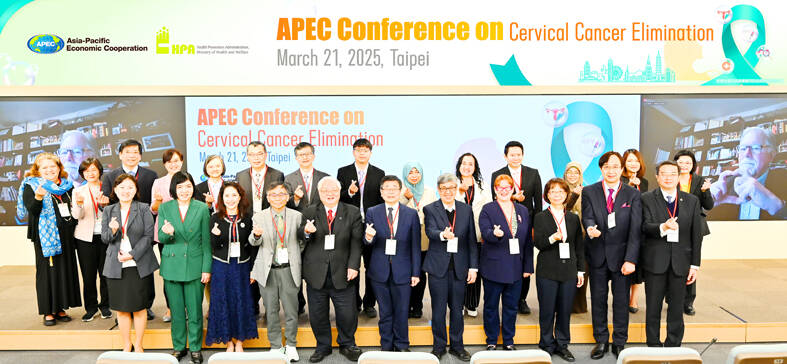Human papillomavirus (HPV) vaccination has reduced instances of cervical cancer and its mortality by about 70 percent among women in Taiwan, the Health Promotion Administration (HPA) said in a statement yesterday following the APEC Conference on Cervical Cancer Elimination.
Health officials from 13 APEC member states attended the one-day event in Taipei.
Former vice president Chen Chien-jen (陳建仁), now a research fellow at Academia Sinica’s Genomics Research Center, spoke about Taiwan’s ongoing fight against cervical cancer at the conference, the HPA said.

Photo courtesy of the Health Promotion Administration
The WHO launched the Cervical Cancer Elimination Initiative with a 2030 goal to inoculate 90 percent of girls under 15, test 70 percent of women aged 34 to 45 for cervical cancer at least twice and successfully treat 90 percent of people with the disease, the agency said.
Taiwan pledged to take part in the initiative, it said.
Citing WHO data, the HPA said that globally in 2022, 650,000 women were diagnosed with cervical cancer, including 350,000 who died from the disease.
Taiwan is among the top performers in the fight against cervical cancer among APEC and Organisation for Economic Co-operation and Development members, it said.
Starting in 1995, the nation rolled out free annual Pap tests for women aged 30 or older and in 2008 began subsidizing HPV vaccines for girls aged 12 to 15, the HPA said.
The policies brought a significant reduction in cervical cancer prevalence and mortality rates, it said.
This year, cervical cancer was the 10th-most common type of cancer and eighth-most common cause of death for women, down from being at the top of the lists, the HPA said.
This year, Taiwan is to launch new measures against HPV, including jabbing boys aged 12 to 15, reducing the age of eligibility for subsidized Pap smears to 25 and offering one free HPV test to women at ages 35, 45 and 65, it said.
The new policies are designed to achieve herd immunity in Taiwan, it said.
Taiwan’s successful experience in suppressing cervical cancer is an example of the nation’s potential to contribute to welfare across the world, the HPA said.

The Chinese military has built landing bridge ships designed to expand its amphibious options for a potential assault on Taiwan, but their combat effectiveness is limited due to their high vulnerability, a defense expert said in an analysis published on Monday. Shen Ming-shih (沈明室), a research fellow at the Institute for National Defense and Security Research, said that the deployment of such vessels as part of the Chinese People’s Liberation Army (PLA) Navy’s East Sea Fleet signals a strong focus on Taiwan. However, the ships are highly vulnerable to precision strikes, which means they could be destroyed before they achieve their intended

About 4.2 million tourist arrivals were recorded in the first half of this year, a 10 percent increase from the same period last year, the Tourism Administration said yesterday. The growth continues to be consistent, with the fourth quarter of this year expected to be the peak in Taiwan, the agency said, adding that it plans to promote Taiwan overseas via partnerships and major events. From January to June, 9.14 million international departures were recorded from Taiwan, an 11 percent increase from the same period last year, with 3.3 million headed for Japan, 1.52 million for China and 832,962 to South Korea,

SOVEREIGNTY: The rigs show that Beijing ‘rejects Taiwan’s jurisdiction’ by building in areas where Taipei demands permission to build or alter installations Chinese oil rigs have been sighted just 26 nautical miles (42km), from Taiwan’s exclusive economic zone (EEZ) near Pratas Island (Dongsha Island, 東沙島), posing a threat to Taiwan’s sovereignty if left unchallenged, a brief published by the Jamestown Foundation on Tuesday said. Pratas Island, 444km from Kaohsiung, is northeast of the South China Sea and houses a Taiwanese garrison. The brief, titled “Rigging the Game: PRC Oil Structures Encroach on Taiwan’s Pratas Island” — referring to the People’s Republic of China — analyzed photographs and said that Beijing’s tools to pressure Taiwan now include oil rigs. “Oil rigs now constitute part of Beijing’s

The Taiwan Experience Education Program (TEEP) has funded short-term internships in Taiwan for more than 4,500 young people from more than 40 countries since 2015, with the goal of attracting and retaining international talent, the Ministry of Education said yesterday. Fifty-five colleges launched 514 projects this year, including in fields such as semiconductors, artificial intelligence, medicine and biotechnology, green energy, and sustainability, it said. The program provides research and practical internships in Taiwan for two to six months, and offers cultural exchange and networking opportunities, the ministry said. For example, National Formosa University’s Embedded System and Autopilot Laboratory developed two solar-powered drones in